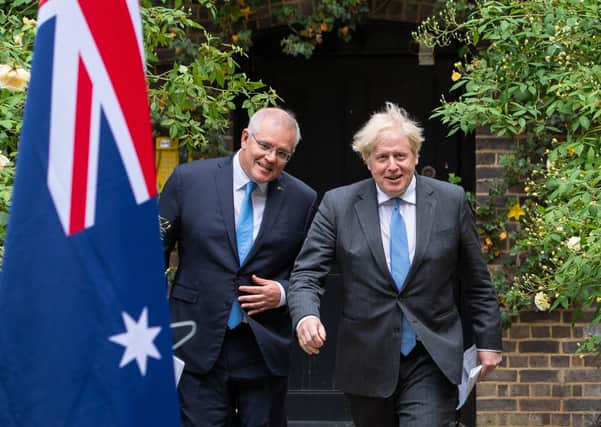New deal will doubtless raise concerns


The principle of zero tariffs has been established and every country the UK negotiates with will see that as a starting point. Betting on which country will follow is between New Zealand and Canada and both could make the threat to agriculture from Australia look modest.
What has happened reflects a mix of political realities. Boris Johnson was desperate to use the G7 summit to deliver some form of trade success. Advocating free trade as the basis for deals can be seen in two ways. Optimists will see it as a confident view of the UK’s export potential. Those of a more cynical or realistic disposition will see it as a gesture you have to make when you lack scale. In trade terms the UK’s 60 million population is small compared to other trade blocs, not least the EU.
Advertisement
Advertisement
Whatever the thinking, farmers now know their industry is deemed less important that whiskey or car exports or even student’s ability to secure visas to work in Australia.
These are the new principles driving trade decisions.
The Trade and Agriculture Commission will doubtless raise the concerns of the farming lobby and British Veterinary Association about animal welfare and other standards in Australian agriculture. These are underlined in a document widely shared on social media, which contrasts the Red Tractor Scheme to standards in Australia. Sadly the issues the Commission raises will fall on deaf ears at Westminster. Johnson and the international trade minister, Liz Truss, need the success of the Australian deal to highlight a positive post-Brexit trade future. Agriculture is now acceptable collateral damage in trade deals and the government has the will and majority to ignore concerns raised. A lonely and one-sided battle lies ahead for the farming lobby and they will have limited support from the food industry. Provided the standard of imports is deemed acceptable by the government it will be happy processing cheaper, imported food. Consumers will be equally happy if they can buy beef, lamb and wine from Australia cheaper than is now the case. If this sounds negative, consider what cheap imports did to the once great industries of textiles and shipbuilding – and how quickly their demise happened one that ball began to roll.
Individuals can choose whether or not to believe assurances from Truss that this will not damage the interests of UK farmers. That is based on a phasing in of zero tariffs and some form of cap on imports in the interim. Truss insists Australian beef will displace imports from the EU, with Ireland the most likely loser. This ignores the economic reality that importing from the EU means importing from a relatively high cost region. This is not the case with Australia, and just as a rising tide lifts all boats a falling tide brings them down. Put a cheap product into a market and the rest of the market moves towards that level. For Johnson this is proof that Brexit offers an alternative to trade with Europe. What it ignores is that for the UK, Ireland is a bigger market than Australia is ever likely to be, and not only for food. Suggesting Australia will push out Ireland does not make great business sense.
The other Truss claim is that the Australia deal will be the opener to the UK to be part of a trans-Pacific trade partnership. She rightly says that Asia will remain a growth market, thanks to a growing, prosperous middle class. What is less certain is her leap from that to suggest this will create new markets for UK beef and lamb. She is ignoring the number of ultra-low cost producers already geared up to supply that market, not least from Australia and New Zealand, not to mention Brazil. She claims the trans-Pacific market, thousands of miles away, represents a potential market of 500 million consumers. Ironically, that is the same size as the EU market right on our doorstep, where the UK has traded successfully for decades. It is an equally inconvenient truth that the EU is targeting Asian markets for trade deals – its existing deal with Japan being the world’s biggest free trade pact. Spin as Truss might, there is no upside in this for farmers.